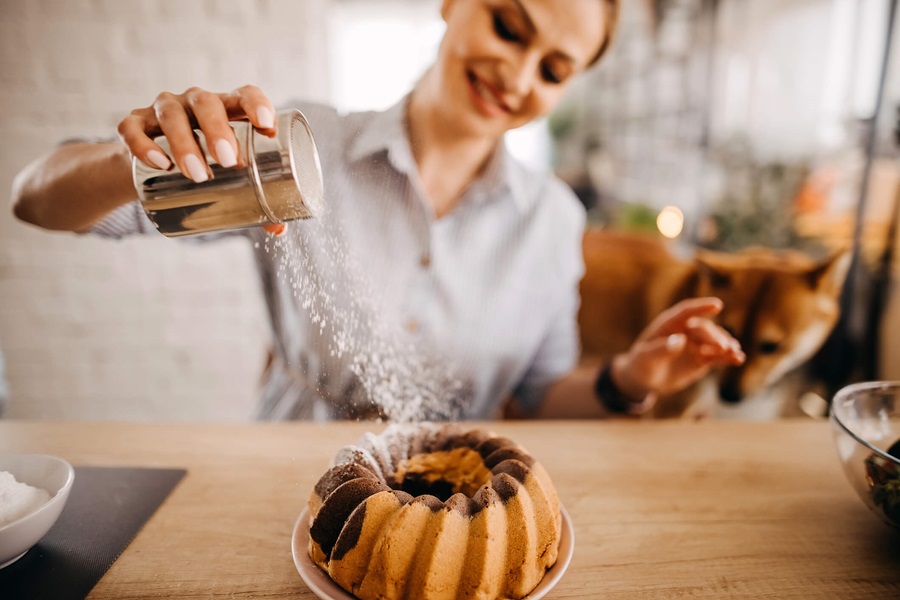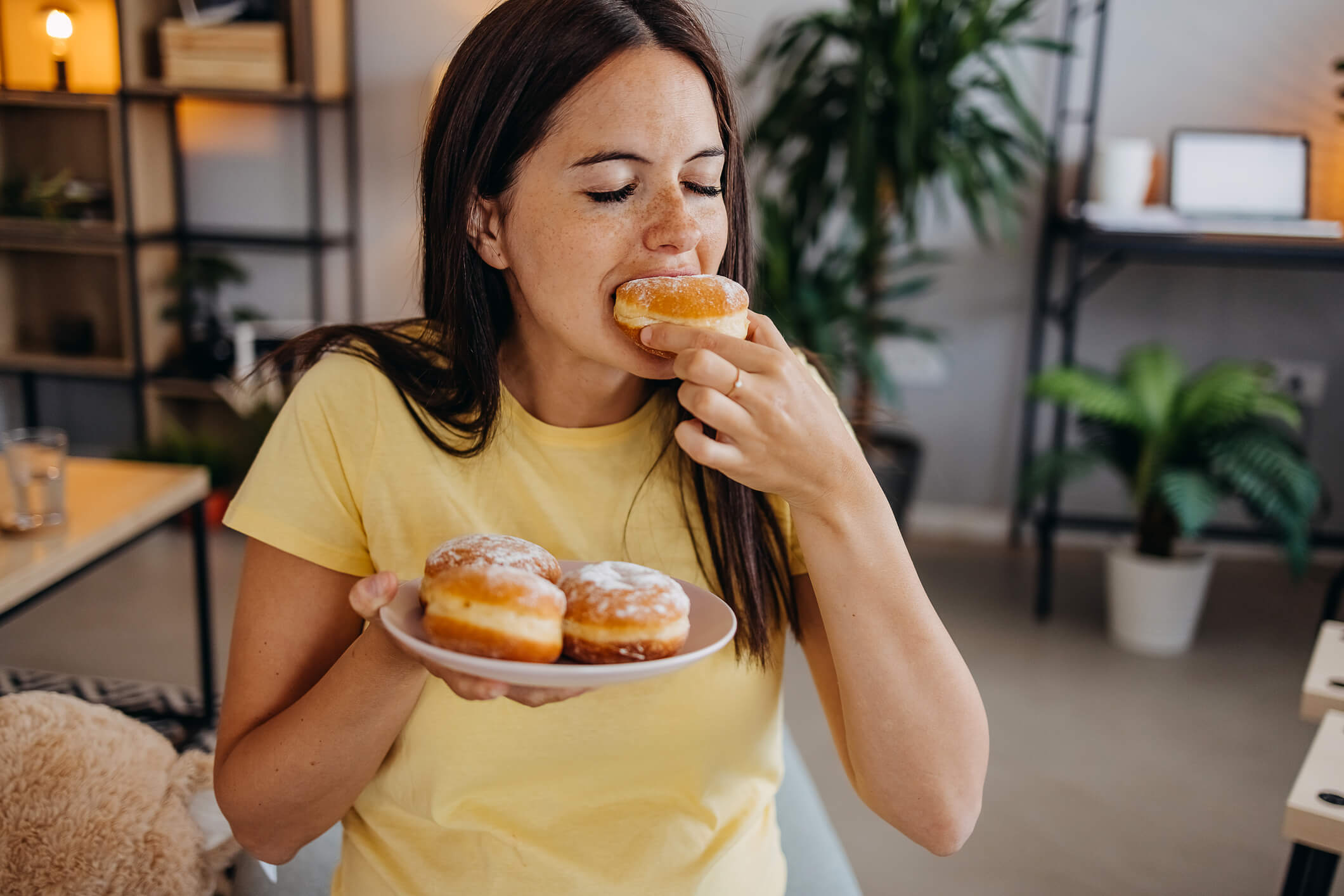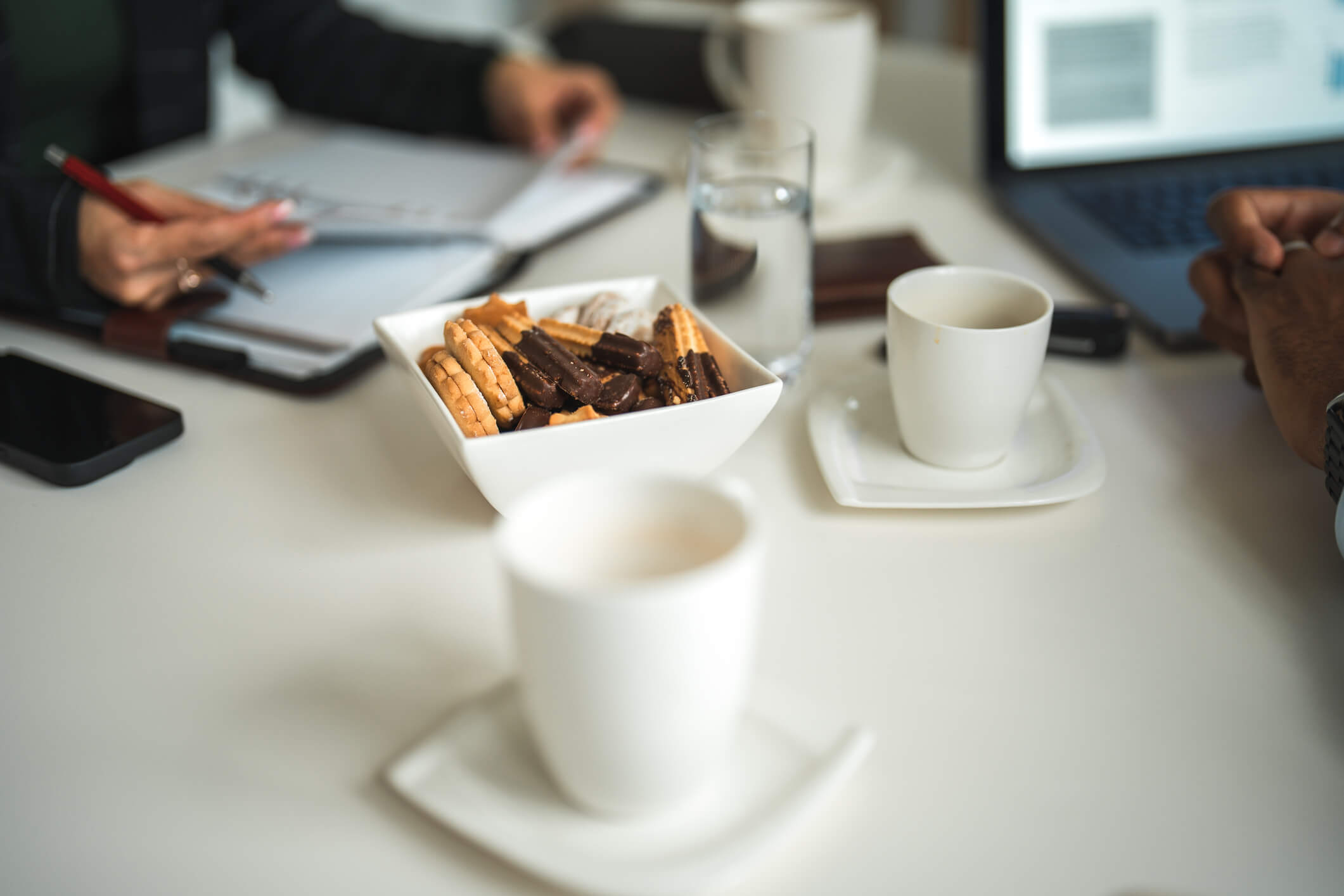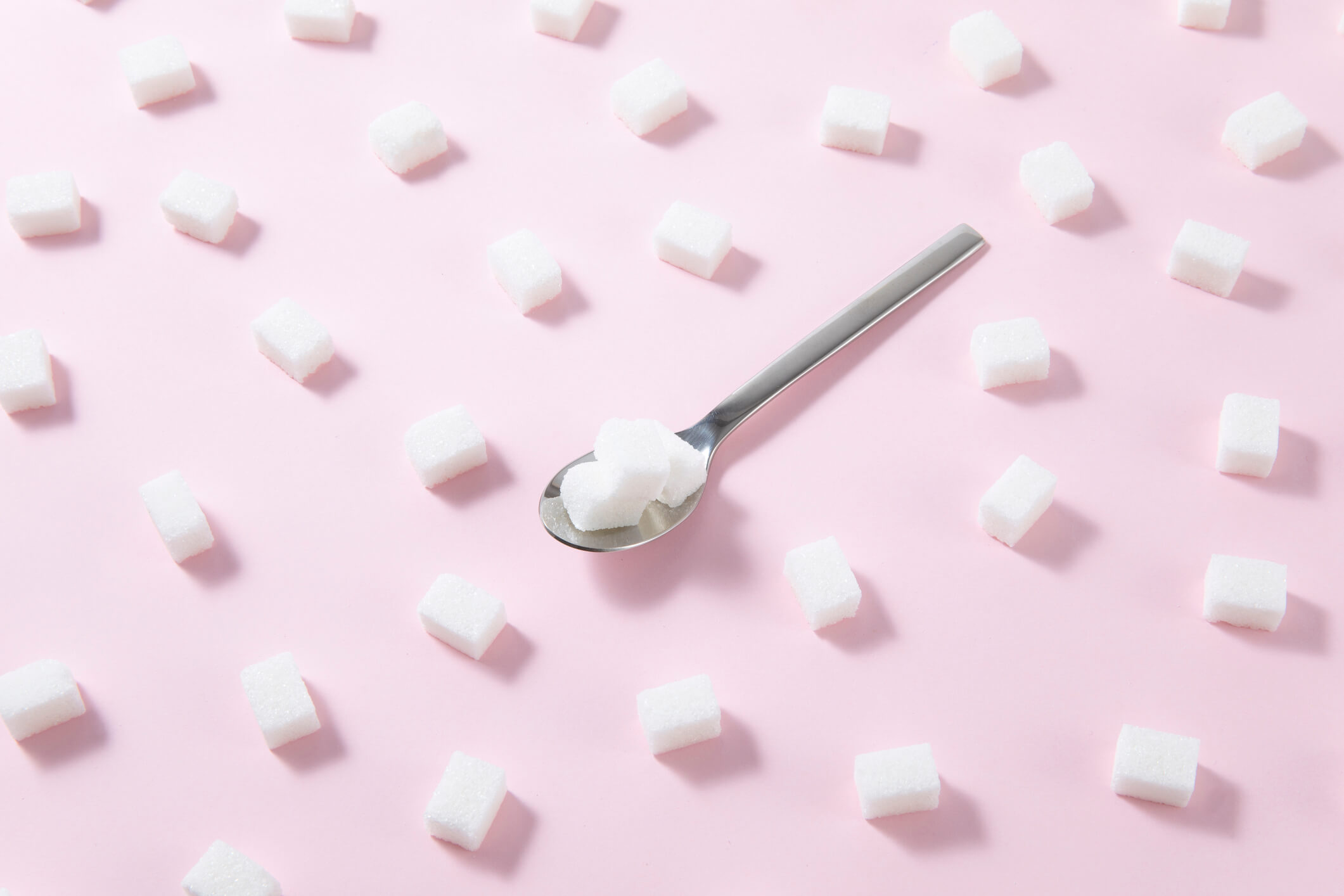- Home
- Mind & body
- Sweet desires: curb your sugar cravings
At CBHS we help you manage your health challenges. We believe in offering you the services, support and tools you need to live your best life.
Our Better Living Programs are available to support eligible members towards a healthier lifestyle. Each Better Living Program is subject to its own eligibility criteria.
Contact us for more information and to confirm your eligibility for a program.
Sweet desires: curb your sugar cravings

Ah, sugar, that’s the stuff. Sometimes when a craving strikes, only something sweet will hit the spot. But it’s not just the tantalising taste that reels us in. There are lots of reasons why we crave the sweet stuff, and some may be more surprising than you think.
Whether it’s a cheeky square (or four!) of choccy in the evening that’s your kryptonite, or a mid-morning doughnut is a must, here are some common physiological and psychological causes for sugar cravings and a few simple ways to manage – and embrace – them.
Stress eating

Do you ever find yourself in a loop of opening the cupboard, then the fridge and reaching for the most satisfying, often sweet snack you can find? We all get stressed and many of us tend to drown out the noise in our head with comfort foods. And there’s a reason we often gravitate to something sweet. When we’re stressed, our cortisol levels rise, as does the hormone ghrelin, which is responsible for increasing our appetite. In response, we seek out something rewarding such as fatty or sugar-laden foods. Research suggests that the immediate effects of eating sugar include increased serotonin and dopamine levels, the brain’s feel-good hormones. However, these effects are short-lived and can leave us stuck in a cycle, which can lead to…
Addiction affliction
Just like alcohol, sugar is often used in a celebratory fashion, or as a reward - birthday cake anyone? And it doesn’t just reward our taste buds, sugar also signals the reward centre in the brain. As mentioned, this releases a sudden rush of dopamine and serotonin, triggering us to want to repeat the satisfying behaviour.
Studies show that sugar activates the opiate receptors in the brain, similar to the effects of drugs, such as cocaine. According to neuroscientist Professor Selena Bartlett from Queensland University of Technology’s Institute of Health and Biomedical Innovation, “Excess sugar consumption has been proven to contribute directly to weight gain. It has also been shown to repeatedly elevate dopamine levels, which control the brain's reward and pleasure centres in a way that is similar to many drugs of abuse including tobacco, cocaine and morphine.
“After long-term consumption, this leads to the opposite, a reduction in dopamine levels. This leads to higher consumption of sugar to get the same level of reward.”
Sleep deprivation
Not getting enough slumber can also trigger our sugar cravings. When we’re sleep deprived, naturally we lack energy, so our bodies turn to quick sources of fuel, ie. sugar. Have you ever wondered why glucose is often marketed as an energy supplement for athletes? Glucose is sugar in its simplest form and our body’s primary form of energy. Some food sources of glucose include table sugar, white bread, honey and dried fruit. If you’re training for a marathon, this energy will be used up as fuel. But if you’re consuming too much and sitting at your desk all day in front of a screen, it will be stored by the body and converted into fat. The spike in energy from simple sugars only lasts for a couple of hours and, depending on how much you’ve consumed, is followed by a depletion of energy, or crash, that leaves us feeling worse than we did beforehand.
Lacking in minerals and vitamins
Our bodies are intuitive, and we often crave foods that contain the vitamins and minerals that we need to function optimally. For example, low iron levels can leave us feeling fatigued, so we may crave that quick fix of energy in the form of sugar. A lack of magnesium, chromium, zinc or calcium, which are responsible for metabolising carbohydrates, as well as other processes in the body, could also be the cause for certain food cravings.
Habitual

Of course, your sugar cravings can come down to something as simple as habit. You’ve become accustomed to that 3pm biscuit with your tea, or that bowl of ice cream after dinner. It satisfies your taste buds and is an enjoyable experience. The key isn’t to eliminate these rituals completely (unless, of course, advised by your doctor due to a medical condition), it’s all about exercising control and consuming sugar-laden foods in moderation.
6 tips to manage your sugar cravings
We know that overconsumption of sugar can lead to health problems such as obesity, type 2 diabetes, high blood pressure, dental cavities and more. The World Health Organization (WHO) recommends that “free” sugars make up no more than 10% of our daily kilojoule intake, which for a healthy adult is about 12 teaspoons or 50 grams per day.
“Currently, it’s estimated that Australians consume 30 teaspoons per day, which is more than twice the recommendation.”

Here are six ways to help curb your sugar cravings:
- Gradually reduce your intake While some health professionals recommend going cold turkey, for those who have trouble limiting their intake of sugar and processed foods, a gradual decrease in consumption is a more manageable way to lower your intake. For example, two squares of quality 70%-cocoa dark chocolate, rather than two rows of milk chocolate. As with most habit-breaking initiatives, the first 48-72 hours are the toughest. But as your body gradually adapts, you’ll soon notice your cravings start to dissipate and you wind up being able to satisfy your sweet tooth with less. You may even find those two sugars in your coffee far too sweet after a while.
- Eat regular, nutritious meals Fuel your body wisely with the vitamins and minerals it needs to perform optimally. Educate yourself and learn to make simple changes to your diet that reap huge rewards to your overall wellbeing.
- Eat mindfully Often we mistake hunger for thirst. You may even confuse hunger pangs with a craving. Ask yourself if you’re actually hungry, particularly if it’s a post-meal snack you’re seeking. As above, tap into what your body needs and make mealtimes a ritual where you sit at a table away from devices and external stimuli and focus on each bite of food. Take small bites and chew your food completely before swallowing. Savour the taste and slow down. We can sometimes eat too quickly, before our gut has signalled to our brain that it is full, and hence we overeat or reach straight for dessert. Sit with the meal for at least 30 minutes after eating and see how you feel.
- Choose wisely Learning to read the nutrition labels of foods and implementing some simple swaps, such as plain or Greek yoghurt with a handful of berries instead of the flavoured variety, can go a long way to help break the habit. One of the biggest issues is not understanding how to read food labels and recognise “hidden” sugars in certain products. Apps such as MyFitnessPal can be great tools to help you understand food labels. You can simply scan the barcodes of items as you shop, and the information will pop right up on your phone.
- Seek out support Speak to your GP, who may recommend therapies such as CBT (cognitive behavioural therapy), to help you understand the root cause of your cravings and offer techniques in your quest to break the habit. If you’re struggling, phone a friend or someone you trust or look for support groups in your local area.
- Get active Go for a walk in the park, hit your local gym or simply get outside and do some gardening. Studies show that time spent in nature may be associated with reduced cravings. Also, getting active not only benefits us physically, but also mentally, with improved mood and better-quality sleep among the advantages. And you may find you’ll want to make healthier meal choices, which will make you feel better overall and motivate you to continue the cycle.
“When you find a craving coming on, try chewing some gum, sipping on herbal tea or drinking some water.”

While examining your diet and cutting back on certain sugar-laden and processed foods may be tough to start with, research suggests once your body adapts to a lower sugar intake, you’ll start to crave sugar less. And your taste buds even adapt! We’re by no means suggesting you forgo that slice of banana bread with your Sunday coffee for good, the key is eating mindfully, in moderation and understanding your level of sugar consumption so that you can begin to make healthier choices and improve your overall wellbeing.
Sources
https://www.ncbi.nlm.nih.gov/pmc/articles/PMC2235907/
https://www.ncbi.nlm.nih.gov/pmc/articles/PMC3109725/
https://www.tri.edu.au/news/treating-sugar-addiction-drug-abuse-qut-leads-world-first-study
https://www.betterhealth.vic.gov.au/health/healthyliving/sugar
https://www.who.int/publications/i/item/9789241549028
https://www.healthdirect.gov.au/vitamins-and-minerals-explained
https://www.cbhs.com.au/mind-and-body/blog/the-three-best-healthy-stress-foods
https://www.cbhs.com.au/mind-and-body/blog/curb-your-cravings-how-to-resist-those-snack-temptations
https://www.cbhs.com.au/mind-and-body/blog/mindfulness-and-mindful-eating-an-activity-to-get-started
https://www.healthdirect.gov.au/how-to-read-food-labels
https://www.health.nsw.gov.au/mentalhealth/services/Pages/support-contact-list.aspx
https://www.sciencedirect.com/science/article/abs/pii/S1353829218308451
https://www.betterhealth.vic.gov.au/health/healthyliving/physical-activity-its-important
All information contained in this article is intended for general information purposes only. The information provided should not be relied upon as medical advice and does not supersede or replace a consultation with a suitably qualified healthcare professional.
Health and wellbeing
programs & support
You Belong to More with CBHS Hospital cover:
- Greater choice over your health options including who treats you
- Get care at home with Hospital Substitute Treatment program
- Free health and wellbeing programs to support your health challenges
Live your healthiest, happiest life with CBHS Extras cover:
- Benefits for proactive health checks e.g. bone density tests, eye screenings
- Keep up your care with telehealth and digital options
- Save on dental and optical with CBHS Choice Network providers
